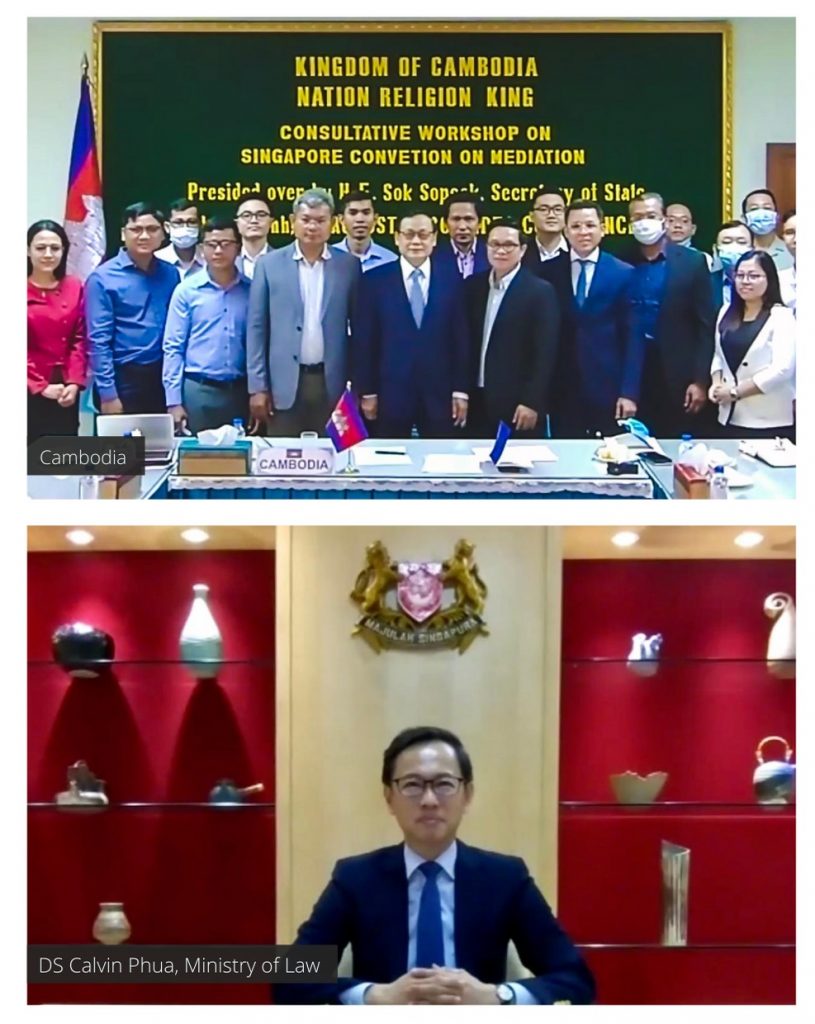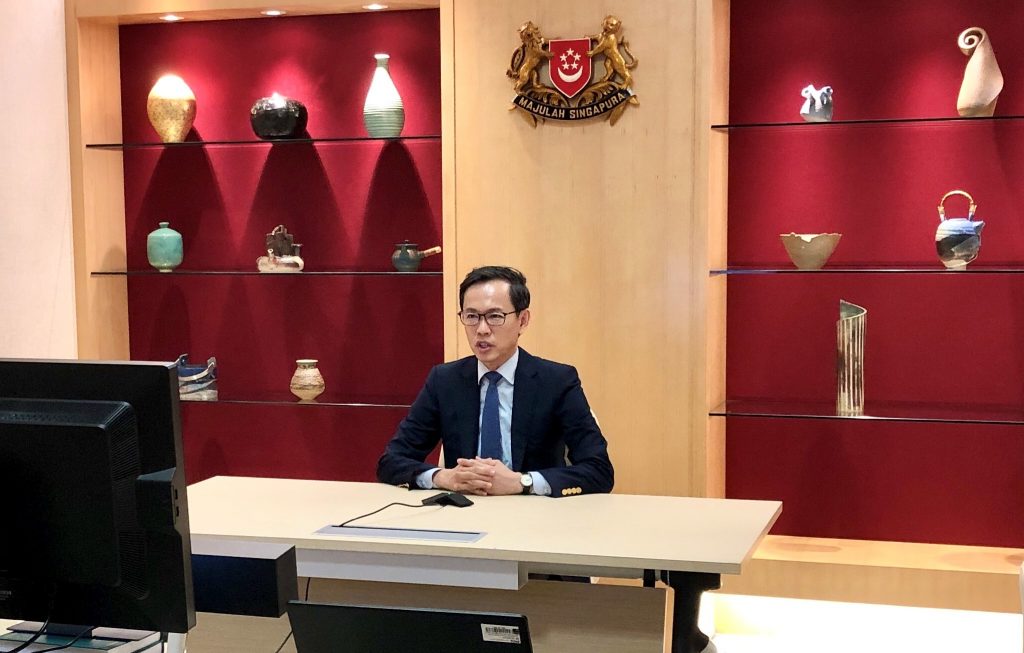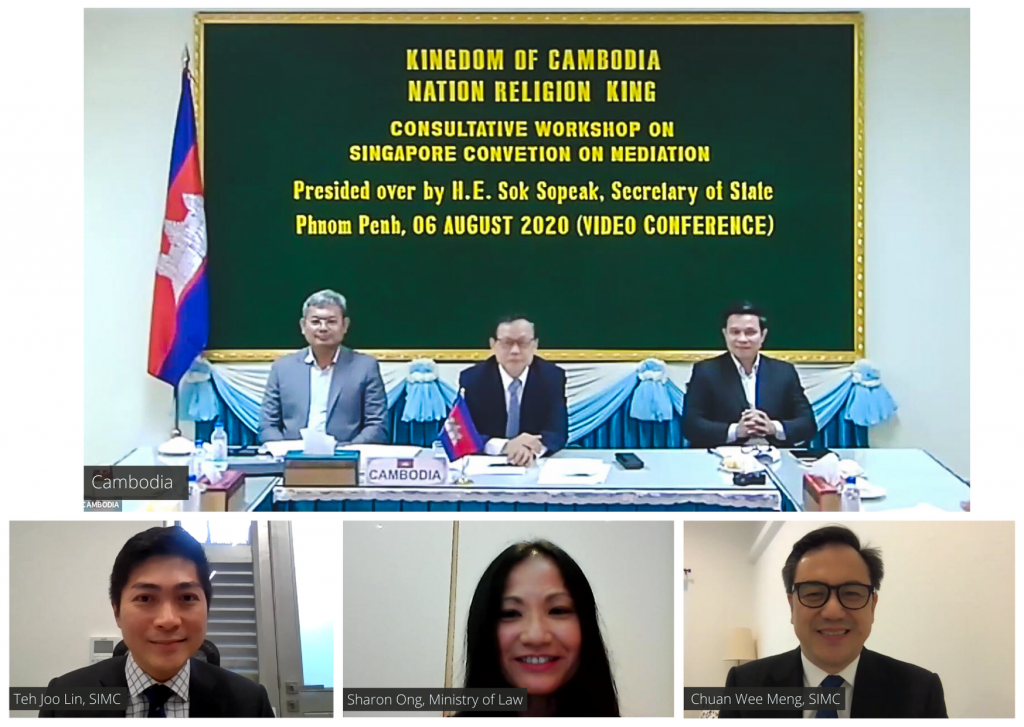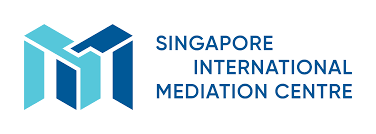Successful Workshop on the Convention for Cambodia
The Singapore International Mediation Centre (SIMC) and Singapore’s Ministry of Law recently ran a consultative workshop on the Singapore Convention on Mediation for senior Cambodian officials.
The aim of the workshop on 6 Aug was to discuss the Convention, including the benefits of Cambodia joining the United Nations trade treaty. Since the Convention opened for signature about a year ago, it has garnered 53 signatories, including five ASEAN countries so far. The Convention enters into force on 12 September.
Cambodia’s interest in joining the Convention was clear.
Mr Sok Sopheak, the Secretary of State for the Ministry of Commerce, presided over the workshop. Joining him were some 20 senior officials from various institutions. Besides Ministry of Commerce officials, there were participants from the Council of Jurists/Council of Ministers, Ministry of Justice, the Ministry of Foreign Affairs and International Cooperation, National Commercial Arbitration Center, Council for the Development of Cambodia, and Bar Association of the Kingdom of Cambodia.

Above: Cambodia’s Secretary of State for the Ministry of Commerce, Mr Sok Sopheak with His Excellency Pich Ang,
Member of the Council of Jurists to his right and His Excellency Liv Sovanna, Member of the Council of Jurists to his left.
Below: Mr Calvin Phua, Deputy Secretary, Ministry of Law Singapore.
The Singapore delegation was led by Deputy Secretary Calvin Phua of Singapore’s Ministry of Law, who was accompanied by Director-General (International & Advisory) Sharon Ong and her team. SIMC’s participants included Chief Executive Officer Chuan Wee Meng and Deputy CEO Teh Joo Lin, who delivered a deep-dive presentation on the Convention.
Ms Ong and Mr Chuan were not unfamiliar faces, having previously conducted a successful 2-day workshop last March in Phnom Penh.
The latest workshop took place under radically different circumstances. The Covid-19 travel restrictions meant that the session was conducted online.
However, the workshop proved to be so engaging that the participants remained online for more than three hours – about an hour later than planned.
Opening Remarks
In his opening remarks, Mr Phua outlined the significance of the Convention, which allows businesses to maximise the benefits of mediation and facilitates the growth of international commerce. The impending entry into force of the Convention was “particularly timely in the current climate”, he said. The widespread impact of the Covid-19 pandemic pointed to a “spike in commercial disputes”, with parties unable to comply with their business obligations.
He said: “Many companies which are in economic difficulties and are facing cashflow issues do not have the capacity to engage in protracted legal proceedings. That is why mediation plays an especially important and relevant role during this period.”

Mr Calvin Phua, Deputy Secretary, Singapore’s Ministry of Law, outlined the significance of the Convention and benefits of mediation in his opening remarks.
Mr Phua also restated Singapore’s long-term commitment to promote the Convention and its adoption. Referring to Cambodia as a long-standing friend whose economic relationship with Singapore remained strong despite the global slowdown, he was hopeful that Cambodia would soon sign the Convention.
In his opening remarks, Mr Sopheak shared that ASEAN and Cambodia were benefiting from increasing investment flows. With rising trade and investment, the attendant issues that arose called for a comprehensive legal framework on mediation and human capacity development. It was against this backdrop that the Cambodian Government was keen to study the implications of joining the Convention.
Presentation on the Convention
During the presentation on the Convention, Mr Teh introduced mediation, its benefits and growing importance. He referred to the findings of the recently announced SIDRA International Dispute Resolution Survey Final Report 2020, which found that users valued arbitration for its enforceability but mediation for its speed and cost.
Mr Teh noted that the data was collected before the Convention opened for signing. With the Convention assuring the enforceability of mediation outcomes, he expected mediation to increase in popularity as “you get the best of both worlds – enforceability, speed and cost”.
A key part of the presentation was an article-by-article analysis of the 16 articles of the treaty, which was approved by the United Nations General Assembly in December 2018.
Mr Teh spoke from his experience at the Ministry of Law, where he was involved in various projects, including UNCITRAL Working Group II, which culminated in the Convention. Having been part of the team that implemented the treaty obligations as domestic law (the Singapore Convention on Mediation Act 2020), Mr Teh also touched on the topics of ratification and implementation.
Q&A
The presentation was followed by a robust Question-and-Answer session.
Mr Sok Sopheak and his colleagues posed many insightful questions, on wide-ranging issues including the application, implications and implementation of the Convention. These queries spawned a constructive and meaningful discussion with Ms Ong, Mr Chuan and Mr Teh that lasted for more than an hour.

Clockwise from above: His Excellency Pich Ang; Mr Sok Sopheak; His Excellency Liv Sovanna; Mr Chuan Wee Meng, SIMC CEO; Ms Sharon Ong, Director-General (International & Advisory),
Ministry of Law Singapore; Mr Teh Joo Lin, SIMC Deputy CEO.
Ms Ong, who led Singapore’s negotiations of the Convention as the Republic’s delegate to UNCITRAL’s Working Group II, recalled that the delegates, including Cambodia’s representative, had cooperated closely to ensure that everyone would be comfortable with the treaty text.
She explained that the Convention’s design is simple, easy to understand and implement, and caters to both common and civil law jurisdictions. She also noted that the Convention could be applied to different countries regardless of their mediation experience.
Mr Chuan was also on hand to inject a commercial perspective, drawing from his experience as a general counsel at IBM. He attested to the benefits of having mediation as a “viable option” to resolve cross-border disputes.
He said: “As a multinational corporation, having the range of dispute resolution mechanisms, whether mediation, arbitration, or litigation, is very important for a company investing in any country.”
The participants from both countries capped the extensive discussion by putting on record their mutual appreciation and agreeing to continue their discussions.
SIMC cherishes the opportunity to contribute to Cambodia’s consideration of the Convention. We are grateful for the positive feedback received and look forward to our next meeting with our Cambodian friends!

